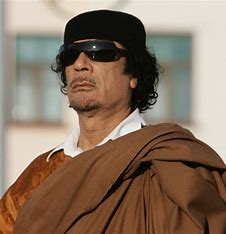Or perhaps he knew only too well. But whoeverwould speak of and treat the basic ordnances of Islam with such blasphemous levity would be liable to say anything about any matter anyhow. First of all, he ought to have known that it was impossible to divide Nigeria into two neat confessional fiefdoms as he suggested; and even if it somehow became possible it would be to nobody’s good. In fact, many of those who thought they needed Nigeria least are likely to end up suffering the most from its breakup.
Second, perhaps with the possible exception of the breakup of Czechoslovakia, there has never been and there will probably never again be a case of a negotiated, peaceful disintegration of any country in the world.
Third, when it breaks out, a partition war in Nigeria may consist of no less than 30 battles in which the major tribal groups will simultaneously be fighting the minorities and each other; before the internal battles, in which Ifes will resume killing Modakekes, forest Igbos will be butchered by village Igbos and Hausas start killing Fulanis.
It will all be a smouldering cauldron of savage violence as hostile warring neighbours engage in an orgy of killing as Nigerian society implodes in a whirlpool of disaster. This implosion will, within its first few weeks, produce a casualty of unimaginable magnitude and an estimated refugee problem of at least 25 percent of the population. A 37.5 million refugee problem is not something that can be managed even by the combined resources of all the relief agencies in the world.
Running helter-skelter, refugees who survived would pour out across borders in all directions putting unprecedented strain and pressure on the societies and economies of Cameroun, Chad, Niger and Benin republics as these countries are forced to take in more than their own population as refugees. This, in turn, will ignite a chain reaction of massive state failure and economic collapse across the West African sub-region and, by extension, the continent.
Srebrenica and Zepa will look like heaven compared to Jos, Kaduna, Modakeke or Port Harcourt. At that time, the only resource that the so-called ethnic nationalities will be running
to control will be their lives. And if after this, there is still a Niger Delta, it will probably constitute the coastal enclave of a still boiling Biafra; or, more likely, a dependent oil-producing outpost of the United States of America.
But if Pakistan is a wrong choice by Gaddafi, Yugoslavia is even more so. Because, despite the 1947 pogroms, the 1965-66 and 1971 wars with India and its child Bangladesh, and the continuing tension necessitating the stationing of 150,000 troops in Kashmir, the ten million refugees uprooted and the hundreds of thousands who died for want of food, and the possibility of nuclear conflict erupting from this precarious balance of terror, a manageable, if scary, stalemate would seem to have been reached. And in any case, Gaddafi has not examined the counter-argument advanced at the time of the partition by Maulana Abul Kalam Azad, who opposed the creation of Pakistan. According to his thesis, today, if Pakistan had not been created, the total population of Muslims in non-partitioned India would have been 543,452,101 [174,578,558 in Pakistan; 137,493,990 in Bangladesh, and 231,579,553 in India], almost the entire population of the African continent in the 1980 s and nearly half of India’s 1,156,897,766, such that they couldn’t have been ignored, bullied or taken for granted. But now, they are catching hell in three different countries.
Of course, Yugoslavia gave the world its first on-screen, modern-day ethnic cleansing; and, perhaps seeing parallel with Plateau State here, Gaddafi thought he could improve his case by suggesting it. Would that he had stuck to his less erroneous Pakistan example; far and away better would it have been for his reputation.
Yugoslavia has already split into six different countries— Bosnia-Herzegovina, Croatia, Macedonia, Serbia, Slovenia and unrecognized Muslim Kosovo, along with the two restive provinces of Vojvodina and Montenegro. The former has remained riotous, the latter is in rump Yugoslavia without the consent of all of its people, and both are almost certain to witness even more bloodshed in the coming years. Because someone might say that Yugoslavia’s breakup came all of a sudden, let’s see how much saner, neater and better anegotiated breakup is. From 1989, when Mikhail Gorbachev became Soviet head of state and the Berlin Wall crumbled, to 1991, when he resigned after negotiating the dissolution of the Soviet Union, trouble and clashes erupted in the Baltic states, in the Caucasus region, in the Central Asian republics and in southern Russia, and at least eleven different full-fledged wars raged; and all of them are still smouldering to this day.
In 1989, there were fierce ethnic clashes in Uzbekistan’s Ferghana Valley, horrendous massacres in Abkhazia, Tbilisi and Ossetia. The following year, Soviet troops were in Azerbaijan and in Kyrgyzstan to restore order and stop ethnic clashes; and in Dushanbe a civil war raged between Tajk and Armenian militias. More than 20,000 died and 700,000 were homeless.
In 1991, Soviet troops were in Latvia’s Riga occupying all key installations, and paratroopers descended on Vilnius in Lithuania to impose an economic blockade.
In 1992, heavy casualties were recorded in the Georgia-Abkhaz conflict and border clashes between Chechnya and Ingushetia, and Russia invaded Chechnya and killed 40,000 people and made 250,000 homeless; and later razed all of Chechen urban areas to the ground. Meanwhile, the civil war in Nagorno-Karabakh had led to 23,000 deaths and one million refugees.
If indeed there are 250 ethnic groups or their dialects, Mu’ammar thinks the solution is to have 250 such statelets in place of one Nigeria. Perhaps Chief Anthony Enahoro and his ethnic nationalities associates might endorse; but to us, it looks like a recipe for opening up 250 battle-fronts. And who wants to fight?
Perhaps later a visionary may arise who will appreciate the virtues of integration and help galvanize Africa towards it. Indeed, Africa should have been a single country; or, if it must be partitioned, it shouldn’t have been carved up into more than three separate countries—West Africa, North Africa and portions of Equatorial Africa should have formed a single country; the Horn of Africa, central Equatoria and East Africa—the home of the Great Rift Valley should have been another; with southern Africa—from Angola down through the cape to Mozambique— constituting the third country. But it was not given to colonialists and it was indeed not the business of colonialism to worry about or plan for the longterm future of its conquered territories, or preserve the culturally homogenous path trodden by the ancient empires of the Western Sudan. Yet, the mirage of cultural homogeneity that Gaddafi is indirectly pining about is neither a condition nor a guarantee for peaceful co-existence or for the sustenance of nationhood. Muslim-majority Ethiopia under Christian Menelik II enjoyed peace and prosperity as a nation and had the internal cohesion necessary to defeat Italy in battle. On the other hand, Somalia, which is 100 per cent Muslim and virtually 100 per cent Hamitic and Bantu Somali in ethnic composition, has been riddled with unlivable violence, proving to be the world’s most woefully failed state.
As a country, Nigeria has not failed—yet; it is Nigerians—theNigerian elite—who have, but instead of admitting it, they are blaming the nation-state. And in the name of fighting for ethnic nationalities, the elite will soon stoke the fire of enmity among the people and succeed in setting brothers at each other’s throats; and yesterdays friends become tomorrows enemies, would-be helpers become instant killers, and hunger and famine stalk the land, killing as many as the weapons of the antagonists fell.
Those looking for a so-called better Nigerian union through the prism of ethnic nationalities will certainly find something; for, they who seek always find; but it is doubtful if what they see or find is going to be national unity—unity in diversity. It will probably be more like unity in disunity, which, being a contradiction in terms, becomes a sure recipe for the collapse of the Nigerian nation-state, in the form of a sacrificial offering to some atavistic ethnic urge.
The breakup a nation is easy to set in motion; but once begun, it is irreversible; and then and only then does it become clear that it is no solution at all. It is always done in the battle-field; and not even the naivety of the patriarch of self-government is likely to alter an established fact And then eventually comes the blood, after which many of the so-called indigenes and as many of the so-called settlers will finally inherit the land—six feet underground But of what use is that to the living? Or even to the dead?


